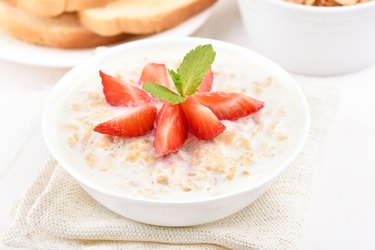
Your colon is a critical part of your digestive system where the process of absorbing nutrients and producing waste is completed so that the stool can then be discharged from your body. The colon is prone to certain diseases, especially if you do not eat enough fiber. Oatmeal is a fiber source and is also a good food to eat after disease flareups. Oats have soluble fiber, giving them other benefits as well.
Definition
Video of the Day
Your colon is also known as your large intestine. Food is chewed in your mouth, where digestion actually starts as saliva begins the breakdown process. You swallow the food into your stomach, and it moves into your small intestine and then into your colon. Your body absorbs nutrients as the food makes its way through your digestive tract. When the material is void of any further nutritional value, it becomes stool and is passed from the colon into your rectum and out through the anus. Fibrous foods like oatmeal and other grains, vegetables and fruits facilitate this process.
Video of the Day
Dietary Considerations
Oatmeal is good for your entire digestive system, including your colon, because it is high in fiber, but it is especially helpful if you have ulcerative colitis, which affects the colon directly, or Crohn's disease, which may attack any part of your lower digestive tract. These diseases give you diarrhea and can damage your intestines. They require a bland diet during flareups because fiber compounds the problems, but the UCSF Medical Center advises that oatmeal is a suitable post-flare way to reintroduce roughage. Other good fiber foods during this period include rice, noodles, mashed potatoes, bread, applesauce and canned fruit.
Prevention
Oatmeal and other high-fiber foods may prevent you from getting colon diseases. The exact method by which roughage works is unknown. Fiber is not digested, but some of it ferments in your colon. This fermentation process may be linked to the preventative health benefits. Your colon does not need cleansing with dietary supplements or water irrigation, even though such products and treatments are available. Eating bulky foods like oatmeal keeps the colon naturally clean.
Other Benefits
Oatmeal helps more than just your colon. Unlike insoluble fiber, which is unchanged after its journey through your digestive tract, oatmeal absorbs water and becomes a jelly-like substance because it is soluble. All soluble fibers affect your absorption of fats and sugars, helping control your glucose and blood cholesterol levels. A 2008 review of studies spanning a decade, published in the "American Journal of Lifestyle Medicine," found that oatmeal and other oat-based products lower both LDL and total cholesterol without affecting HDL, or good, cholesterol.
- National Institute of Diabetes and Digestive and Kidney Diseases: "Your Digestive System & How it Works"
- UCFS Medical Center; Nutrition Tips for Inflammatory Bowel Disease; August 2011
- MedlinePlus: Fiber
- American Journal of Lifestyle Medicine; State of the Art Reviews: The Oatmeal-Cholesterol Connection, 10 Years Later; Mark Andon & James Anderson; January/February 2008